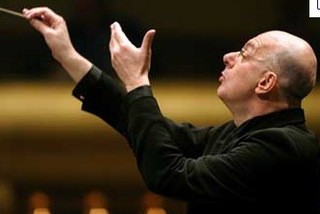|
Back
Disinterring Music New York
Isaac Stern Auditorium, Carnegie Hall
05/30/2014 -
Max Reger: Eine vaterländische Ouvertüre, opus 140
Charles Ives: Orchestral Set No. 2
Ernest Bloch: Israel, Symphony for Orchestra
Karol Szymanowski: Symphony No. 3, “The Song of the Night”, opus 27
Erika Keissewetter (Violin), Blair McMillen (Piano), Sarah Griffiths (Soprano), Corey Bix (Tenor), Denis Stedov (Bass), William Schimmel (Accordion)
The Collegiate Chorale Singers, James Bagwell (Director), American Symphony Orchestra, Leon Botstein (Conductor)

L. Botstein (© Stephen J. Sherman)
Leon Botstein is a most audacious composer, writer and musical director. But it took real chuzpah to begin last night’s concert with Deutschland, Deutschland, über alles.
Mr. Botstein had no regrets. This was a concert devoted to music written about the time of the First World War, and the German/Austrian-Hapsburg military alliance was filled with many a Jewish soldier. Their national anthem, in fact (written by Josef Haydn) would not become anathema until a few decades later.
Thus, in one of his typically erudite essays, conductor Botstein easily framed Max Reger’s nationalistic Overture for the Fatherland within those times of political nationalism. He had many an opportunity to display this music, but to his credit, the conductor of the American Symphony Orchestra never selected the most ordinary works. No Finlandia, no Josef Suk Czech music. His four works were, as usual, rare. And if some of the music he dug up might have deserved to be interred, at least Mr. Botstein gave us a chance to listen to these rarities.
The two works of the first half were tiring. Max Reger (whose 485 pounds might have entitled him to write about “Der Fatter-land”), was a fine organist, and his variations (including the oft-misspelled “Variations on a Merry Theme by Hiller”) are good listening. But his orchestration seemed to be made of organ-stops and thick organ chords, as in his “Patriotic Overture” last night.
Either that, or the massive American Symphony Orchestra was unable to separate the wheat–those quotes from patriotic German music–from the chaff of huge contrapuntal writings. We could feel the chorales of the national anthem and the other songs, but they were hidden behind a wall of unending strings and winds and brasses.
Nor did the following Ernest Bloch Israel offer more transparency. The 30-minute-long uninterrupted paean of Bloch to his native religion had little to do with Judaism save for the movement titles. During the preceding century, Reform Judaism had expunged much of the traditional “wailing” (Wagner’s description) for music which echoed Methodist hymn tunes. So the composer probably didn’t wish to actually go into the historical Jewish chants.
The result was something which reeked of movie music (perhaps the music of Cecil B. DeMille’s first production of Ten Commandments). As with Max Reger, Ernest Bloch never regarded the 20th Century paring of orchestral forces. Mr. Botstein gave us all the force of the American Symphony Orchestra.
The Collegiate Chorale Singers came as a welcome relief. Some beautiful solos, some excellent lean singing–but I was quite confused by Bloch’s repetition of the words “My Elohim”. Never in any liturgy had I heard this word for God used with the possessive case. God is such a transcendent creature that the idea of Mankind “owning” or “cherishing” in an almost sensuous relationship, was somewhat off-putting.
The second half was, frankly, a relief, from the monolithic sounds. Mr. Botstein enlisted the help of some terrific soloists–accordion star William Schimmel, violinist Erika Keissewetter–as well as an orchestra which used its forces sparingly.
The Ives Orchestral Set No. 2 has one of the most stunning finales of anything he ever wrote, the choral voices singing “In the Great Bye and Bye” to commemorate the sinking of the British Lusitania. Before that, Ives had built his American epic up with ragtime and hymns and multi-layered spectra. Mr. Botstein tried his best, with pianist Blair McMillen, but it was something of a blur.
Then again, the title of the program, “Forged By Fire”, was rather mysterious. Mr. Botstein frequently uses Procrustean logic. stretching his massive knowledge of history to make his musical points. In this case, “Forged By Fire:” didn’t mean too much. Even if the final piece was the most worthwhile of all.
Karol Szymanowski was given a gorgeous reading a few days ago with his First Violin Concerto. This Third Symphony has nothing to do with being forged with fire. Based on a Polish translation of Persian poetry, it is opulent, a bit garish, has a masterly tenor solo (given with stentorian mastery by Corey Bix), a soaring violin solo (Concertmaster Erika Keissewetter) and is ravishing in its own way.
Mr. Botstein, who had given a Szymanowski opera in his Bard Festival several years ago, knows his composer well. If it smacked too much of Scriabin’s Poem of Ecstasy, it is still beautiful in its own way. Whether forged in fire or simply a an opulent piece of music, this Symphony was perhaps the only work which gave full and even passionate satisfaction.
Harry Rolnick
|